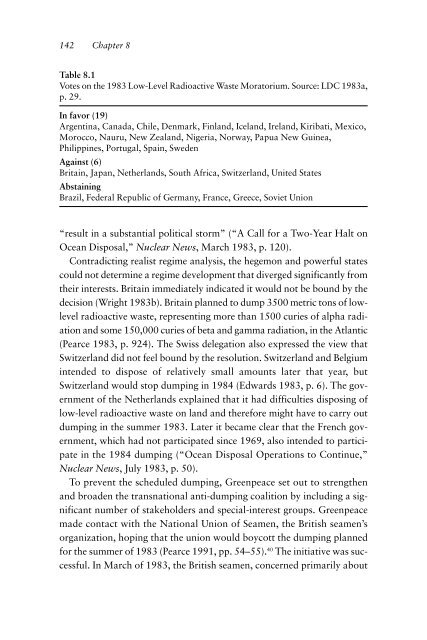Radioactive Waste Disposal at Sea: Public Ideas ... - IMO
Radioactive Waste Disposal at Sea: Public Ideas ... - IMO
Radioactive Waste Disposal at Sea: Public Ideas ... - IMO
Create successful ePaper yourself
Turn your PDF publications into a flip-book with our unique Google optimized e-Paper software.
142 Chapter 8<br />
Table 8.1<br />
Votes on the 1983 Low-Level <strong>Radioactive</strong> <strong>Waste</strong> Mor<strong>at</strong>orium. Source: LDC 1983a,<br />
p. 29.<br />
In favor (19)<br />
Argentina, Canada, Chile, Denmark, Finland, Iceland, Ireland, Kirib<strong>at</strong>i, Mexico,<br />
Morocco, Nauru, New Zealand, Nigeria, Norway, Papua New Guinea,<br />
Philippines, Portugal, Spain, Sweden<br />
Against (6)<br />
Britain, Japan, Netherlands, South Africa, Switzerland, United St<strong>at</strong>es<br />
Abstaining<br />
Brazil, Federal Republic of Germany, France, Greece, Soviet Union<br />
“result in a substantial political storm” (“A Call for a Two-Year Halt on<br />
Ocean <strong>Disposal</strong>,” Nuclear News, March 1983, p. 120).<br />
Contradicting realist regime analysis, the hegemon and powerful st<strong>at</strong>es<br />
could not determine a regime development th<strong>at</strong> diverged significantly from<br />
their interests. Britain immedi<strong>at</strong>ely indic<strong>at</strong>ed it would not be bound by the<br />
decision (Wright 1983b). Britain planned to dump 3500 metric tons of lowlevel<br />
radioactive waste, representing more than 1500 curies of alpha radi<strong>at</strong>ion<br />
and some 150,000 curies of beta and gamma radi<strong>at</strong>ion, in the Atlantic<br />
(Pearce 1983, p. 924). The Swiss deleg<strong>at</strong>ion also expressed the view th<strong>at</strong><br />
Switzerland did not feel bound by the resolution. Switzerland and Belgium<br />
intended to dispose of rel<strong>at</strong>ively small amounts l<strong>at</strong>er th<strong>at</strong> year, but<br />
Switzerland would stop dumping in 1984 (Edwards 1983, p. 6). The government<br />
of the Netherlands explained th<strong>at</strong> it had difficulties disposing of<br />
low-level radioactive waste on land and therefore might have to carry out<br />
dumping in the summer 1983. L<strong>at</strong>er it became clear th<strong>at</strong> the French government,<br />
which had not particip<strong>at</strong>ed since 1969, also intended to particip<strong>at</strong>e<br />
in the 1984 dumping (“Ocean <strong>Disposal</strong> Oper<strong>at</strong>ions to Continue,”<br />
Nuclear News, July 1983, p. 50).<br />
To prevent the scheduled dumping, Greenpeace set out to strengthen<br />
and broaden the transn<strong>at</strong>ional anti-dumping coalition by including a significant<br />
number of stakeholders and special-interest groups. Greenpeace<br />
made contact with the N<strong>at</strong>ional Union of <strong>Sea</strong>men, the British seamen’s<br />
organiz<strong>at</strong>ion, hoping th<strong>at</strong> the union would boycott the dumping planned<br />
for the summer of 1983 (Pearce 1991, pp. 54–55). 40 The initi<strong>at</strong>ive was successful.<br />
In March of 1983, the British seamen, concerned primarily about

















